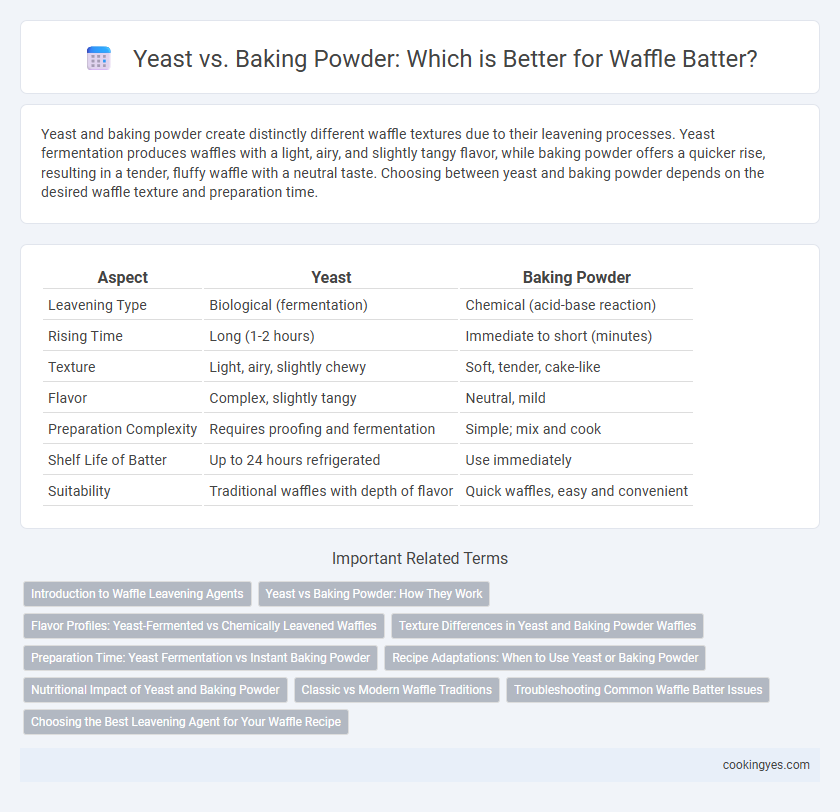Yeast and baking powder create distinctly different waffle textures due to their leavening processes. Yeast fermentation produces waffles with a light, airy, and slightly tangy flavor, while baking powder offers a quicker rise, resulting in a tender, fluffy waffle with a neutral taste. Choosing between yeast and baking powder depends on the desired waffle texture and preparation time.
Table of Comparison
| Aspect | Yeast | Baking Powder |
|---|---|---|
| Leavening Type | Biological (fermentation) | Chemical (acid-base reaction) |
| Rising Time | Long (1-2 hours) | Immediate to short (minutes) |
| Texture | Light, airy, slightly chewy | Soft, tender, cake-like |
| Flavor | Complex, slightly tangy | Neutral, mild |
| Preparation Complexity | Requires proofing and fermentation | Simple; mix and cook |
| Shelf Life of Batter | Up to 24 hours refrigerated | Use immediately |
| Suitability | Traditional waffles with depth of flavor | Quick waffles, easy and convenient |
Introduction to Waffle Leavening Agents
Yeast and baking powder serve as primary leavening agents in waffle batter, each impacting texture and flavor differently. Yeast ferments sugars in the batter, producing carbon dioxide that creates a light, airy crumb and a distinctive, slightly tangy taste. Baking powder acts as a chemical leavening agent, releasing carbon dioxide rapidly during cooking to yield a crisp, tender waffle with a neutral flavor profile.
Yeast vs Baking Powder: How They Work
Yeast ferments sugars in the waffle batter, producing carbon dioxide slowly, which results in a light, airy texture with a distinctive flavor that develops over time. Baking powder releases carbon dioxide immediately upon hydration and heat exposure, creating a quicker rise and a denser, softer waffle texture. The choice between yeast and baking powder depends on desired flavor complexity and preparation time for the waffle batter.
Flavor Profiles: Yeast-Fermented vs Chemically Leavened Waffles
Yeast-fermented waffle batter develops complex, mildly tangy flavors due to fermentation, producing a rich, bread-like aroma and a slightly chewy texture. Baking powder-leavened waffles offer a lighter, crispier texture with a clean, neutral taste, allowing toppings to stand out more distinctly. The choice between yeast and baking powder influences both the depth of flavor and the waffle's overall mouthfeel, catering to diverse preferences.
Texture Differences in Yeast and Baking Powder Waffles
Yeast waffles develop a chewy, airy texture with distinct pockets due to fermentation, creating a complex flavor and crisp exterior. Baking powder waffles exhibit a lighter, fluffier interior with a tender crumb and quicker rise, resulting in a softer bite. The chemical leavening of baking powder produces uniform bubbles, while yeast fermentation yields varied air pockets enhancing texture depth.
Preparation Time: Yeast Fermentation vs Instant Baking Powder
Yeast fermentation requires a longer preparation time, typically needing 1 to 2 hours for the dough to rise and develop flavor, whereas instant baking powder provides immediate leavening, allowing waffle batter to be cooked within minutes. Yeast-based batters result in a chewy texture and complex taste due to fermentation, while baking powder yields a lighter, fluffier waffle with a milder flavor. Choosing between yeast and baking powder impacts not only preparation duration but also the final waffle's texture and depth of flavor.
Recipe Adaptations: When to Use Yeast or Baking Powder
Yeast is ideal for waffle batter recipes that require a rich, airy texture with a slightly tangy flavor, as it fermentation process adds depth and complexity. Baking powder suits quick waffle recipes needing immediate rise and lightness without fermentation time, perfect for weekday breakfasts or when convenience is key. Recipe adaptations should consider yeast for traditional Belgian waffles or thicker batters, while baking powder works well for thin, crispy waffles with faster preparation.
Nutritional Impact of Yeast and Baking Powder
Yeast enhances waffle batter by promoting fermentation that produces B vitamins and increases protein digestibility, contributing to a more nutritious waffle. Baking powder acts as a leavening agent without adding nutritional value, relying on chemical reactions to create carbon dioxide for fluffiness. Nutritionally, yeast-infused waffles offer benefits such as improved gut health and nutrient absorption, whereas baking powder waffles provide consistent texture without altering micronutrient content.
Classic vs Modern Waffle Traditions
Classic waffle recipes traditionally rely on yeast for leavening, producing a rich, airy texture and complex flavor through fermentation, which can require longer preparation times. Modern waffle recipes often favor baking powder, enabling quick batter preparation and a lighter, crispier texture ideal for convenience and fast cooking. The choice between yeast and baking powder significantly impacts the waffle's taste, texture, and preparation method, reflecting evolving culinary preferences from traditional to contemporary waffle-making.
Troubleshooting Common Waffle Batter Issues
Yeast-based waffle batter often results in a light, airy texture but requires longer fermentation time, which can lead to inconsistent rising if temperature and timing are not controlled. Baking powder provides a quicker leavening reaction, ideal for faster waffle preparation but may cause uneven bubbles or a denser texture if not properly mixed. Troubleshooting common waffle batter issues involves ensuring the correct balance of ingredients, proper resting time for yeast waffles, and gentle folding to maintain gas bubbles in baking powder recipes for optimal crispness and fluffiness.
Choosing the Best Leavening Agent for Your Waffle Recipe
Choosing between yeast and baking powder as leavening agents significantly impacts the texture and flavor of waffles. Yeast produces a distinctive, airy crumb and a subtle tang from fermentation, ideal for recipes that require longer rising times and complex flavors. Baking powder offers a quicker chemical reaction, yielding light and fluffy waffles with a tender crumb, perfect for fast preparation without sacrificing texture.
Yeast vs Baking powder for waffle batter Infographic

 cookingyes.com
cookingyes.com